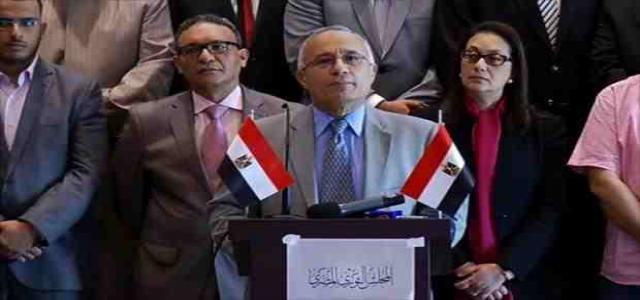- EGYPT
- July 28, 2015
- 11 minutes read
Egyptian Revolutionary Council Issues Document Protecting the Egypt Revolution

Security without despotism – development without corruption – democracy without exclusion
After decades of dictatorship and domination of what is known as economic, intellectual, political and military elites, the will of the Egyptian people was reflected clearly in the January 25 revolution as the corrupt Mubarak regime collapsed, replaced by a State that reflected popular will and protected national harmony, for all individuals, groups and factions.
It is our belief that there is an urgent need to unite all the Egyptian people, in order to build modern Egypt, which is currently being destroyed under a clear and detailed scheme – since the July 3, 2013 coup.
The Egyptian Revolutionary Council (ERC) has issued this draft document for discussion by the people of Egypt in order to achieve consensus around it, and so the people achieve their aspirations of living in freedom, social justice and human dignity – for which we all turned out on January 25, 2011, and for which we all sacrificed and still do.
First: Bill of Rights and Basic Principles for future Egypt
This document represents the desired objective of our revolutionary work, and details it in a set of main principles in recognition of rights and freedoms. It also represents the main foundations for the final status, which we aspire for under the umbrella of a Constitution which will achieve and protect it.
1) The Egyptian people are the source of authority.
2) The armed forces will not intervene in political affairs.
3) All citizens are equal before the law in public rights and duties without discrimination in the exercise of these rights
4) Citizens’ rights and freedoms cannot be removed or curbed.
5) Every worker has the right to wages that provide at least a minimum standard of dignified living.
6) Any security agency or institution that physically or psychologically tortures citizens will be help criminally responsible. These crimes will not be time-barred.
7) No exceptional courts will be set up under any name, for any reason.
Second: Code of Honor for Revolution partners
The ERC is working hard to:
1) Unite all the people, groups and individuals working for the Egyptian Revolution to achieve the objectives of the January 25 Revolution.
2) Face corruption, authoritarianism and military rule. All ERC activities will be in accordance with the principles of alignment of Egyptian citizens, revolutionary and national groups at home and abroad under the banner of the January 25, 2011 Revolution. All national groups will be committed to defeat and reverse the military coup and all counter-revolution forces which ushered back into power the authoritarian military regime.
3) Seek the full rights of the Revolution’s martyrs, wounded and detainees.
4) Document the lessons learned, with self-assessment and review, since the Revolution.
5) Make every effort to achieve societal reconciliation, and respect for political, cultural and religious diversity in Egypt, rejecting all signs of exclusion or marginalization of any component of the forces of the Revolution.
6) Build a development model that will lead to decentralization, and liberalization of the national decision.
7) Re-evaluate all agreements, contracts and international treaties signed by the military coup regime.
Third: Vision and Principles of the transitional period
This vision is the way to building a fair democratic state, and to ensuring fundamental rights and freedoms for all the Egyptian people. To reach those goals, society needs a participatory transitional period, with no monopoly by any faction on power or political decision-making.
This will be a period of time sufficient to fix what has been ruined by the coup regime and the long years of dictatorship before the January 2011 Revolution, including the restoration of the relationship among all segments of the Egyptian people on the basis of tolerance, respect for others and non-discrimination. This will also include the rebuilding of state institutions to carry out its established functions, reforming the economy to help it improve – after the damage inflicted upon it by the repressive and corrupt junta regime, by rationalization of management and confronting financial and administrative corruption, and reclaiming the rights of the Egyptian people and their looted wealth at home and abroad.
* This will be achieved by returning to democratic legitimacy represented in the first civilian president elected by the people, that is President Mohamed Morsi, and setting out the relationship between all state institutions during that transitional stage by a referendum on a constitutional declaration defining its features. Meanwhile, the armed forces will return to their barracks and distance themselves from the political arena.
A body comprising legal experts and politicians known for their competence and integrity to study the necessary amendments in the Constitution of 2012. The resulting charter will be submitted for popular dialogue.
A transitional government will be set up, comprising persons known for their fair and efficient work.
A transitional program will be prepared for economic and social development. This should reflect and represent the Egyptian Revolution, ensuring the rights of the poor and marginalized groups. It will also put an end to social injustice.
Necessary rules will be developed to consolidate the existing values of justice for societal reconciliation and fair and prompt retribution, and a comprehensive law will be issued to achieve justice and rebuild all state institutions on a sound footing.
An urgent restructuring will be launched for the police, the army, the judiciary, the prosecution service and diplomatic missions, to ensure the independence of all authorities.



